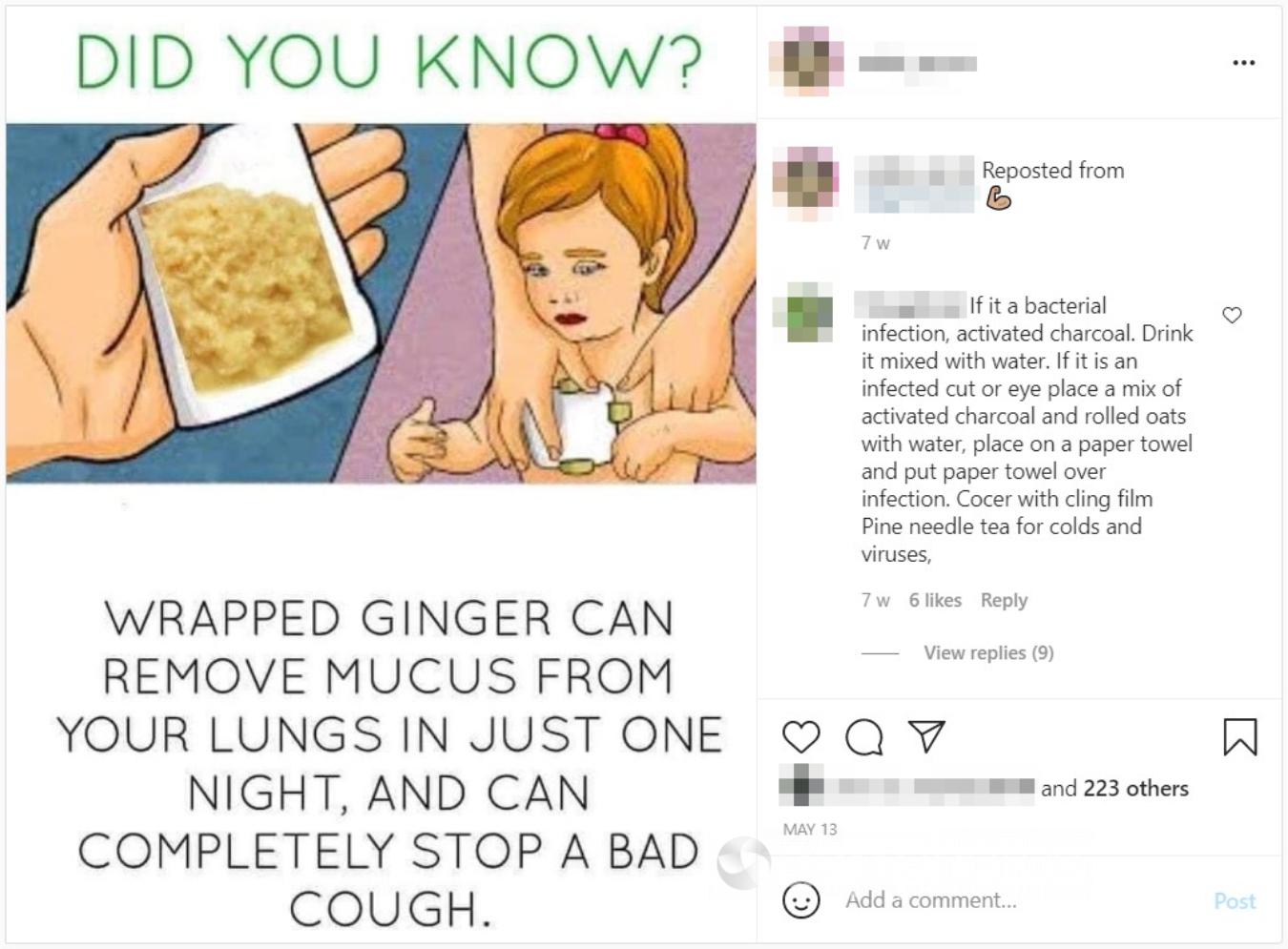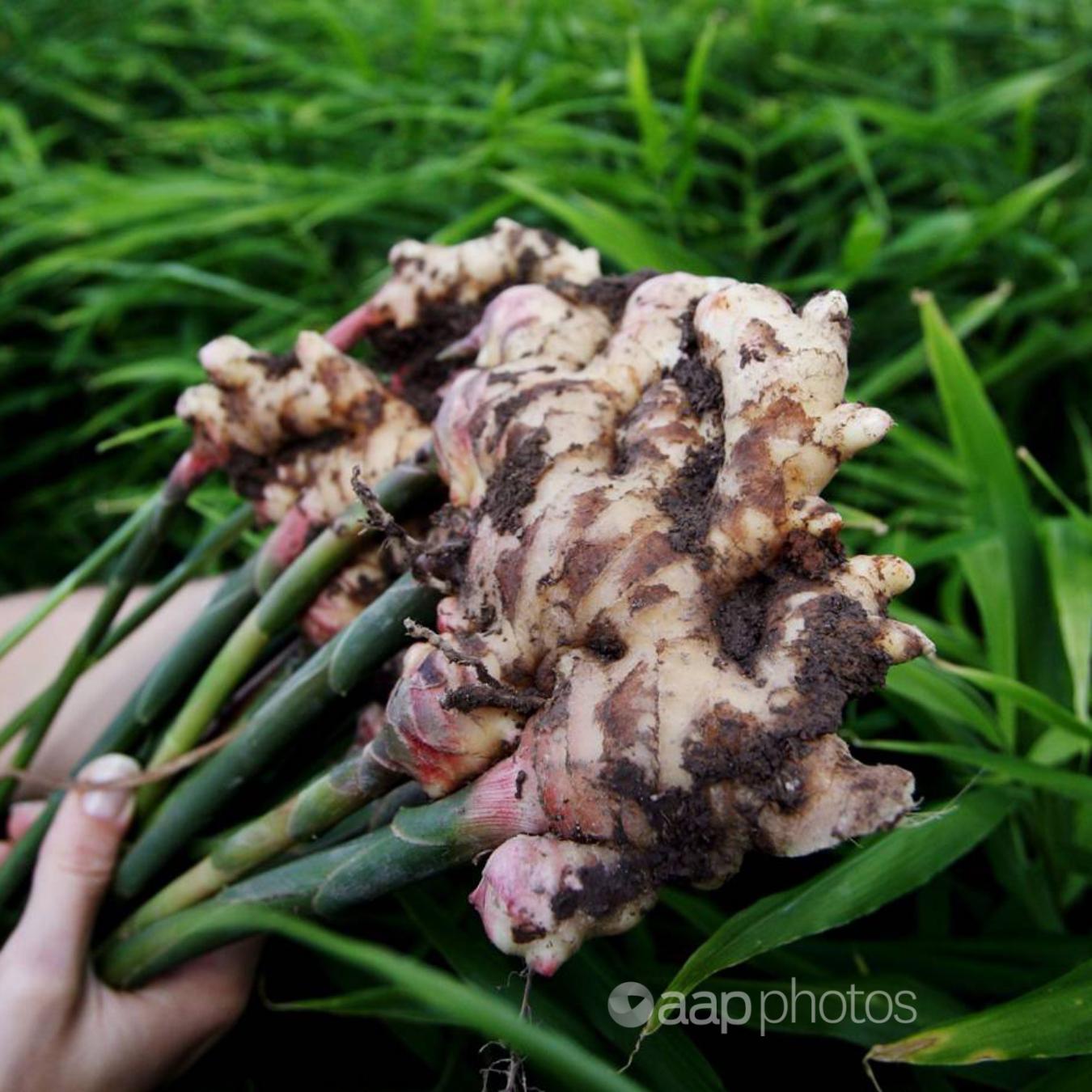The Statement
A social media post claims that a treatment of ginger applied to the skin has remarkable healing properties – removing mucus from the lungs overnight and putting an end to severe coughs.
The May 13 Instagram post from a New Zealand-themed account includes a meme which shows an image of a child with a dressing attached to their chest.
“Wrapped ginger can remove mucus from your lungs in just one night, and can completely stop a bad cough,” the meme’s text says. Similar memes have also been shared from accounts based in the Philippines, Portugal and the United States, among other locations.

The Analysis
While ginger may have beneficial properties, experts say there is no medical evidence to support the post’s health claims – nor is it biologically plausible that applying such a treatment to the skin would be effective.
Ginger has been identified as having potential anti-inflammatory properties, with one 2011 journal article suggesting its compounds could be used in drugs to combat respiratory infections based on laboratory tests on human cells.
Research has suggested gingerols and shogaols, the pungent compounds present in the rhizomes of fresh and dried ginger respectively, could have wide-ranging biological properties, including anti-oxidant, anti-microbial and anti-allergic effects, if used in therapeutic treatments.
Ginger has also been touted in online articles as a potentially beneficial home remedy, for example as a treatment for acute bronchitis or to prevent colds, although these articles often provide little or no medical evidence to back up the claims, and commonly focus on oral consumption of ginger rather than application to the skin.
For example, one article points to a review of ancient folk recipes by Iranian scholars of traditional medicines published in the Jundishapur Journal of Natural Pharmaceutical products as a source, but that review notes further research is needed to support the purported health benefits.
An article for WebMD by pediatrician and medical editor Hansa Bhargava says ginger is a common folk treatment for a range of maladies, from an upset stomach to nausea and painful periods. Her summary makes no suggestion that it can remove mucus congestion or stop a bad cough when applied to the skin, but does note it’s unclear if a ginger compress can lessen pain.
Professor Brian Oliver, a research leader at the Woolcock Institute specialising in respiratory viral infections, told AAP FactCheck in a phone interview there is no real evidence to support ginger being effective against coughs and colds.
Prof Oliver said a lot of plant-derived medicines have their roots in Chinese traditional medicine, which consists of combining many ingredients together.
“But for ginger, alone, there’s absolutely no evidence whatsoever, whether it’s ingested, taken as a tea or put on the skin, to support its utility,” he said.
Associate professor Yuben Moodley, a respiratory physician from the University of Western Australia’s Institute for Respiratory Health, agreed, telling AAP FactCheck the claim is almost certainly not credible given the wide range of coughs and the serious underlying lung diseases often associated with them.
“There are no studies that have studied ginger to any great extent, or to any extent to my knowledge, that would allow doctors to recommend its use in our practices,” he said in a phone interview.
Both experts were also highly skeptical of the wrapping method, questioning how ginger could impact the lungs when applied to the skin.
Prof Oliver said it would be “quite remarkable” if the method worked as it was “the wrong route of delivery”.
“Whatever’s in the ginger would need to be absorbed through the skin, then go into the bloodstream, around the body and end up in the lungs before some medicinal effects can actually cure your cough and cold,” he said.
New Zealand pharmacist and medical doctor Shaun Holt, who has authored numerous books on natural products, told AAP FactCheck that he could not find any evidence in the medical literature that a ginger wrap on the chest could help remove mucus from the lungs or help a bad cough.
He also said it was not biologically plausible that sufficient ginger could enter the bloodstream via the skin to have an effect, or that sufficient vapour could be inhaled by a person wearing the wrap.
“Nausea is a different matter, and ginger is proven to be effective; one large study worked out the dose needed and found it to be effective for nausea caused by chemotherapy,” he said.
The Cochrane review website, a not-for-profit collection of systematic scientific reviews, identifies few clear benefits to the use of ginger other than as a potential treatment for nausea.
The Verdict
There is no scientific evidence to support the post’s claims that a ginger wrap can remove mucus from the lungs or stop a bad cough.
Experts say such an outcome is highly implausible given the lack of any such proven effects from ginger, and the improbability enough ginger to have a biological impact could be absorbed through the skin or inhaled through vapour from a wrap applied to the chest.
False – Content that has no basis in fact.
* AAP FactCheck is an accredited member of the International Fact-Checking Network. To keep up with our latest fact checks, follow us on Facebook and Twitter.
All information, text and images included on the AAP Websites is for personal use only and may not be re-written, copied, re-sold or re-distributed, framed, linked, shared onto social media or otherwise used whether for compensation of any kind or not, unless you have the prior written permission of AAP. For more information, please refer to our standard terms and conditions.


















